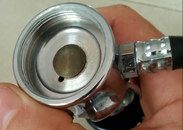oldschoolto
Contributor
Apparently you have not seen the videos where they crash new cars into old cars. N
Yes I have... Years ago they didn't understand that letting the car crumble and leaving the body tightly belted in the cage of the passenger compartment would work better then building the car to take all the impact... That almost all came from racing car builders.. Then moving in to the DOT and crash testing of cars and highway designs.. I still have the straight shaft steering box in my 55 Bel-Air... You know the one before the "D" shaft collapsing rag joint used from the 60's to this day...
I don't want to sound like we should stand still.... But, It's hard to beat good old school engineering of a lot of stuff.. I still use the 1960 metal case craftsman skill saw my grandfather gave me... See if the new skill saws last more then a few weeks building houses... I still have and use the 1950's metal case cake mixer that I got from my grandma... Sometimes, They just built it right....
Jim...




